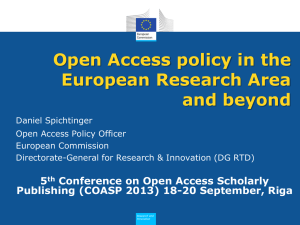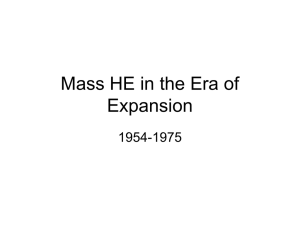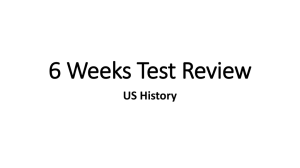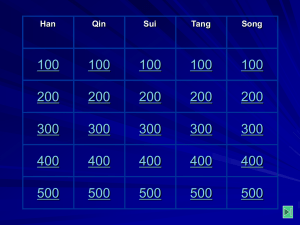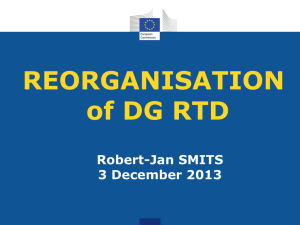Item 4 - ERA Monitoring « 1.51MB
advertisement
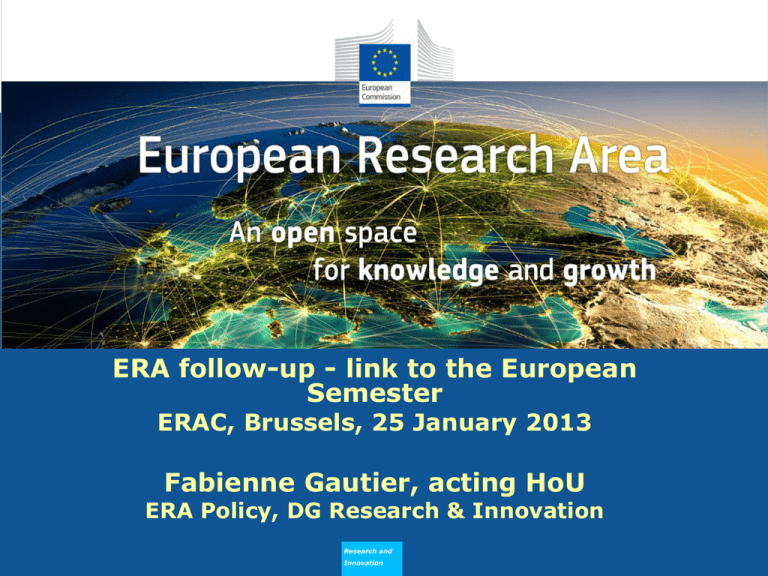
Why does ERA Need to Flourish ERA follow-up - link to the European Semester ERAC, Brussels, 25 January 2013 Fabienne Gautier, acting HoU ERA Policy, DG Research & Innovation Research and Innovation Outline • ERA Council Conclusions of 11.12.2012 as • • • crucial basis for follow-up on the ERA Communication by Member States Building up the ERA monitoring mechanism and delivering the ERA progress report Further guidance for 2013's National Reform Programmes Milestones in 2013 2 Research and Innovation ERA Council Conclusions 11.12.2012 (1) • To achieve the ERA, the Council INVITES Member States: • to identify the ERA national reforms and actions, according to their national specificities • to present these ERA national reforms and subsequent implementation in their National Reform Programmes, starting from the 2013 European Semester • to cooperate with national research stakeholder organisations in implementing the ERA actions 3 Research and Innovation ERA Council Conclusions 11.12.2012 (2) • Achieving the ERA will also require: Monitoring of ERA progress in close connection with the European Semester Top-level steering by the Council • The Commission is invited to develop a robust ERA Monitoring Mechanism • ERAC is invited to provide strategic advice to the Council 4 Research and Innovation The ERA monitoring mechanism (EMM) • Objectives : Identify progress in achieving ERA Help the political steering process Identify areas where further progress is needed • How will it work ? An annual reporting cycle will be set up from 2013 onwards: The Commission will issue an annual ERA progress report in September, in close interaction with ERAC 5 Research and Innovation The European Semester • 17 June 2010: adoption of Europe 2020 Strategy for jobs, sustainable and inclusive growth Link with the ERA Communication: • EU headline indicator: "improving conditions for R&D, in particular with the aim of raising combined public and private investment levels in this sector to 3% of GDP" 6 Research and Innovation Europe 2020 integrated guidelines • Europe 2020 strategy is underpinned by a set of Europe 2020 integrated guidelines : • 13 July 2010: guidelines for the economic policies as Council Recommendation including "Optimising support for R&D, strengthening the knowledge triangle and unleashing the potential of the digital economy" • 21 October 2010: guidelines for the employment policies of the Member States 7 Research and Innovation Guideline 4 for Economic Policies link with ERA • "reforms should foster excellence" • "helping to facilitate […] merit-based competition" More effective national research systems • "national funding schemes adapted and simplified" • "orienting them towards higher growth while addressing major social challenges • "ensure the development of world class infrastructures [..] infrastructures made accessible… Optimal transnational co-operation and competition 8 Research and Innovation Guideline 4 for Economic Policies link with ERA • • "attractive careers and the mobility of researchers […] promoted" "improve governance of research institutions" An open labour market for researchers • "improve governance of research institutions" Gender quality and gender mainstreaming • • "reinforce cooperation between public, private and third sector players […] ensure development of infrastructures and networks that ensure knowledge diffusion" "promote the development and use of modern accessible online services, including by further developing e-identity" Circulation, access to and transfer of scientific knowledge 9 including Digital ERA Research and Innovation 2013 Commission Guidance for NRP "In relation to the Europe 2020 headline target to improve the conditions for R&D, Member States are invited to outline their actions to complete the ERA" (Commission guidelines on the content and format of the National Reform Programmes as sent to MS on 14 January 2013, p. 4) 10 Research and Innovation 2013 Commission Guidance for NRP (2) • The NRP´s have rolling character: State of implementation to be indicated (enacted or planned) • Chapter 4. Progress towards national Europe 2020 targets - Short overview of main priorities/reforms (Annex) • Chapter 5. […] the use of structural funds – To indicate which relevant EU funding programmes (ERDF/ESF/CF, Horizon 2020,..) are relevant for the ERA reforms • Annex 3 reporting table which could be used to report on ERA measures Research and Innovation 11 ERA already in 2012 NRP's • Most NRP´s focus on business environment for research and innovation, in that context also knowledge transfer covered • Research infrastructures mentioned frequently • Efficiency of research funding covered -scope varies substantially (institutional vs calls) • Low attention to cross-border cooperation, openness of labour markets for researchers, gender issues and Open Access 12 Research and Innovation Milestones 2013 • 18-19 February 2013: Competitiveness Council - policy • • • • • • debate on European Semester based on progress report encompassing Annual Growth Survey 2013 14-15 March: European Council – assessment of progress 2012 CSRs - guidance to MS 2013 NRPs 21 March 2013: ERAC Mutual Learning Exercise 15 April 2013: MS submit NRP´s including ERA measures April-September: analysis by Commission of ERA progress based also on input ERAC and ERA groups September 2013: first ERA Progress report October/November 2013: ERAC opinion on ERA Progress report (debate in Council – pos. Conclusions) 13 Research and Innovation Thank you for your attention! http://ec.europa.eu/research/era Research and Innovation

